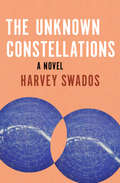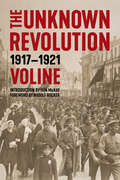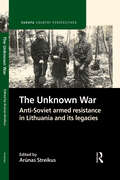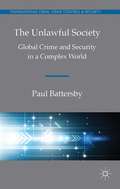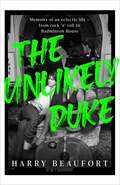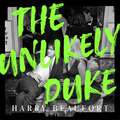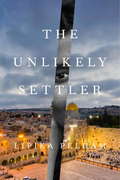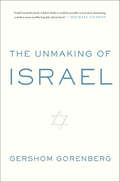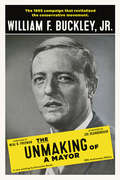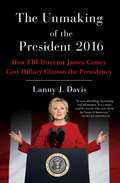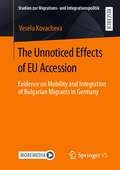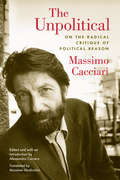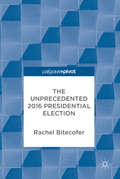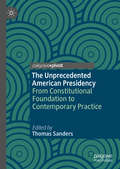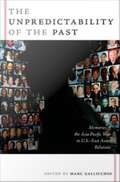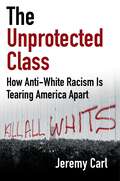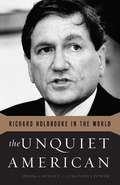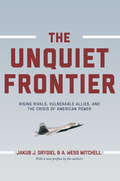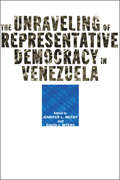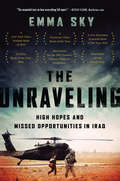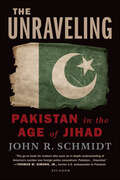- Table View
- List View
The Unknown Constellations: A Novel
by Harvey SwadosWhen Jack Rodenko shipped out as a sailor during World War II, he never imagined that real adventure would be waiting for him at home in New OrleansThe Crescent City after the war is at the heart of a rapidly changing America, and ex-sailor Jack Rodenko is caught up in a strange and shifting milieu as he tends bar at a seedy club called L&’Êtoile. While struggling to build a new life, Rodenko becomes involved with a corrupt, greedy power broker, and falls in love with a striking photographer—relationships that will force him to choose between two decidedly different futures. First published decades after the author&’s death in 1972, The Unknown Constellations is the first novel by unsung postwar literary hero Harvey Swados. Through these pages, we can trace the origins of a unique voice and an unerring conscience.
The Unknown Constellations: A Novel
by Harvey SwadosWhen Jack Rodenko shipped out as a sailor during World War II, he never imagined that real adventure would be waiting for him at home in New OrleansThe Crescent City after the war is at the heart of a rapidly changing America, and ex-sailor Jack Rodenko is caught up in a strange and shifting milieu as he tends bar at a seedy club called L&’Êtoile. While struggling to build a new life, Rodenko becomes involved with a corrupt, greedy power broker, and falls in love with a striking photographer—relationships that will force him to choose between two decidedly different futures. First published decades after the author&’s death in 1972, The Unknown Constellations is the first novel by unsung postwar literary hero Harvey Swados. Through these pages, we can trace the origins of a unique voice and an unerring conscience.
The Unknown Revolution: 1917–1921
by Voline Iain McKayThis is the untold story of the Russian Revolution: its antecedents, its far-reaching changes, its betrayal by Bolshevik terror, and the massive resistance of non-Bolshevik revolutionaries. This in-depth, eyewitness history written by Voline, an outspoken activist in the Russian Revolution, contains a biography of the author by Rudolf Rocker and a contemporary introduction from anarchist historian Iain McKay Significant attention is given to what the author describes as "struggles for the real Social Revolution"; that is, the uprising of the sailors and workers of Kronstadt in 1921, and the peasant movement that Nestor Makhno led in the Ukraine. These movements, which sought to defend the social revolution from destruction by the politicians, provide important material for a clearer understanding of both the original objectives of the Russian Revolution and the problems with which all revolutions with far-reaching social objectives have to contend. Of particular interest to the student of the Russian revolution are the chapters of personal experiences and those in which the author, drawing on the revolutionary press of the time, reveals the deep cleavage between the objectives of the Libertarians and those of the Bolsheviks, differences which the latter "resolved" by ruthlessly eliminating all those who stood in their way in the struggle for power. This edition is a translation of the full text of La Révolution inconnue, first published in 1947. It reinstates material omitted from earlier English-language editions and reproduces the complete text of the original volumes. Voline, writer, educator, and poet, was exiled by the Tsarist tribunal and ordered by Trotsky to be executed but was rescued by protests. He never ceased to live up to his chosen nom de guerre, based on the Russian word for freedom.
The Unknown War: Anti-Soviet armed resistance in Lithuania and its legacies (Europa Country Perspectives)
by Arūnas StreikusThe armed anti-Soviet resistance movement which arose in the second half of 1944 in Lithuania, as Soviet forces began to reoccupy the Baltic countries and Galicia, sparking a nearly decade-long fierce military conflict, has yet to become established in the common narrative of contemporary European history. However, controversy regarding the nature of this `war after the war' and its legacies constitutes one of the core elements in the contemporary information warfare waged by Russia against its neighbouring countries. The origins of various distortions surrounding the story of the partisan war in the western borderlands of the Soviet Union can even be traced to the final stages of that war, when Soviet propaganda sought to discredit the campaign as a battle waged by criminal elements. In this example of a historical event charged with controversial memories and geopolitical connotations, a thorough academic approach is extraordinarily instrumental. Responding to the growing need for historical research capable of providing international readers with the latest findings in the thematic field under question, six scholars from Vilnius University address the diverse aspects of this phenomenon as well as its role in the culture and politics of memory. Toward this end, this analysis – among the most comprehensive explorations of this history to date – is being released in both Lithuanian and English.
The Unlawful Society
by Paul BattersbyExploring the dynamics of law-making in a world where the pace of technological change is outstripping our capacity to capture new forms of transnational crime, this book uses the innovative concept of unlawfulness to examine the crimes of the global overworld, forming a unique analysis of global order in the twenty-first century.
The Unlikely Candidate: What Losing an Election Taught Me about How to Change Politics
by Ali MilaniAcross the Western world, people are desperate for a radical shift in politics and for new kinds of politicians. Primary defeats for established figures and shock results in referendums are becoming the norm, while outsiders are shaking up political cultures. In this book, Ali Milani, a rising star in the UK’s Labour Party, brings a unique perspective to the key political issues we're facing in the wake of the COVID-19 pandemic, and shows how young people from all walks of life can engage in politics to transform our country and the world. Drawing on his rollercoaster campaign against Prime Minister Boris Johnson in the UK’s 2019 general election and his time in Bernie Sanders’ campaign team, he aims to inspire a new generation, including the disenfranchised, disillusioned and marginalised, to raise their voices and change mainstream politics for the better.
The Unlikely Duke: Memoirs of an eclectic life - from rock 'n' roll to Badminton House
by Harry Beaufort'Beaufort chronicles his unusual and rarified world with flashes of Wodehousian genius'. --- Jools Holland'So funny ... bristling with glamorous but eccentric characters'. --- Jilly Cooper'Very funny and touching, gentle, wise and unpretentious. This is a book I absolutely loved.' --- Anne GlenconnerThe 12th Duke of Beaufort, known to his friends as 'Bunter', inherited his Dukedom and Badminton House in 2017, at the age of sixty-five. But he is also a singer and songwriter with the rock group The Listening Device. Now he combines his responsibilities as Duke with his life as a rock performer. In this lively and anecdote-filled memoir, Harry Beaufort takes us behind the scenes of his varied life: from playing poker with politicians, to partying on Ibiza with film stars to people watching with The Queen from a balcony at Windsor Castle. He offers an intimate portrait of aristocratic privilege and a lifetime filled with rock stars, royalty, eccentrics and jaw-droppingly unbelievable stories. But Harry also offers a sensitive and perceptive insight into the worlds he has inhabited and the friendships and laughter that he has experienced along the way. This is the story of an ordinary man facing up to his extraordinary inheritance-the story of The Unlikely Duke.
The Unlikely Duke: Memoirs of an eclectic life - from rock 'n' roll to Badminton House
by Harry Beaufort'Beaufort chronicles his unusual and rarified world with flashes of Wodehousian genius'. --- Jools Holland'So funny ... bristling with glamorous but eccentric characters'. --- Jilly Cooper'Very funny and touching, gentle, wise and unpretentious. This is a book I absolutely loved.' --- Anne GlenconnerThe 12th Duke of Beaufort, known to his friends as 'Bunter', inherited his Dukedom and Badminton House in 2017, at the age of sixty-five. But he is also a singer and songwriter with the rock group The Listening Device. Now he combines his responsibilities as Duke with his life as a rock performer. In this lively and anecdote-filled memoir, Harry Beaufort takes us behind the scenes of his varied life: from playing poker with politicians, to partying on Ibiza with film stars to people watching with The Queen from a balcony at Windsor Castle. He offers an intimate portrait of aristocratic privilege and a lifetime filled with rock stars, royalty, eccentrics and jaw-droppingly unbelievable stories. But Harry also offers a sensitive and perceptive insight into the worlds he has inhabited and the friendships and laughter that he has experienced along the way. This is the story of an ordinary man facing up to his extraordinary inheritance-the story of The Unlikely Duke.
The Unlikely Duke: Memoirs of an eclectic life - from rock 'n' roll to Badminton House
by Harry Beaufort'Beaufort chronicles his unusual and rarified world with flashes of Wodehousian genius'. --- Jools Holland'So funny ... bristling with glamorous but eccentric characters'. --- Jilly Cooper'Very funny and touching, gentle, wise and unpretentious. This is a book I absolutely loved.' --- Anne GlenconnerThe 12th Duke of Beaufort, known to his friends as 'Bunter', inherited his Dukedom and Badminton House in 2017, at the age of sixty-five. But he is also a singer and songwriter with the rock group The Listening Device. Now he combines his responsibilities as Duke with his life as a rock performer. In this lively and anecdote-filled memoir, Harry Beaufort takes us behind the scenes of his varied life: from playing poker with politicians, to partying on Ibiza with film stars to people watching with The Queen from a balcony at Windsor Castle. He offers an intimate portrait of aristocratic privilege and a lifetime filled with rock stars, royalty, eccentrics and jaw-droppingly unbelievable stories. But Harry also offers a sensitive and perceptive insight into the worlds he has inhabited and the friendships and laughter that he has experienced along the way. This is the story of an ordinary man facing up to his extraordinary inheritance-the story of The Unlikely Duke.
The Unlikely Settler
by Lipika PelhamThe Israeli-Palestinian conflict seen by an outsider who craves to make sense of herself, her marriage, and the city she lives inThe Unlikely Settler is none other than a young Bengali journalist who moves to Jerusalem with her English-Jewish husband and two children. He speaks Arabic and is an arch believer in the peace process; she leaves her career behind to follow his dream. Jerusalem propels Pelham into a world where freedom from tribal allegiance is a challenging prospect. From the school you choose for your children to the wine you buy, you take sides at every turn.Pelham's complicated relationship with her husband, Leo, is as emotive as the city she lives in, as full of energy, pain, and contradictions. As she tries to navigate the complexities and absurdities of daily life in Jerusalem, often with hilarious results, Pelham achieves deep insights into the respective woes and guilt of her Palestinian and Israeli friends. Her intelligent analysis suggests a very different approach to a potential resolution of the conflict.
The Unmaking of Israel
by Gershom Gorenberg“Closely argued and conditionally apocalyptic . . . Gorenberg outlines many reasonable steps Israel should take to disentangle religion from the state.” —Jeffrey Goldberg, The New York Times Book ReviewProminent Israeli journalist Gershom Gorenberg offers a penetrating and provocative look at how the balance of power in Israel has shifted toward extremism, threatening the prospects for peace and democracy as the Israeli-Palestinian conflict intensifies. Informing his examination using interviews in Israel and the West Bank and with access to previously classified Israeli documents, Gorenberg delivers an incisive discussion of the causes and trends of extremism in Israel’s government and society. Michael Chabon, Pulitzer Prize-winning author of The Amazing Adventures of Kavalier and Clay, writes, “until I read The Unmaking of Israel, I didn’t think it could be possible to feel more despairing, and then more terribly hopeful, about Israel, a place that I began at last, under the spell of Gershom Gorenberg’s lucid and dispassionate yet intensely personal writing, to understand.”“At the core of the book lies a terrifying analogy: Israel as Pakistan, a country whose government has empowered a lawless, fanatical religious movement now subverting the very state that empowered it. Is the analogy apt today? No, but Gorenberg makes a frighteningly convincing case that it might be soon.” —Peter Beinart, Newsweek“Gorenberg provides a deft but penetrating and highly nuanced account of the recent history and current politics of Israel . . . He issues a heartfelt and heart-rending plea for the repair of the Jewish democracy.” —The Jewish Journal“Sure to raise contention, a strong dissenting voice from a burdened land where dissent is not simply tolerated, but a way of life.” —Kirkus Reviews
The Unmaking of a Mayor
by William F. Buckley Jr.John V. Lindsay was elected mayor of New York City in 1965. But that year's mayoral campaign will forever be known as the Buckley campaign. "As a candidate," Joseph Alsop conceded, "Buckley was cleverer and livelier than either of his rivals." And Murray Kempton concluded that "The process which coarsens every other man who enters it has only refined Mr. Buckley."The Unmaking of a Mayor is a time capsule of the political atmosphere of America in the spring of 1965, diagnosing the multitude of ills that plagued New York and other major cities: crime, narcotics, transportation, racial bias, mismanagement, taxes, and the problems of housing, police, and education. Buckley's nimble dissection of these issues constitutes an excellent primer of conservative thought.A good pathologist, Buckley shows that the diseases afflicting New York City in 1965 were by no means of a unique strain, and compared them with issues that beset the country at large. Buckley offers a prescient vision of the Republican Party and America's two-party system that will be of particular interest to today's conservatives. The Unmaking of a Mayor ends with a wistful glance at what might have been in 1965-and what might yet be.
The Unmaking of the President 2016: How FBI Director James Comey Cost Hillary Clinton the Presidency
by Lanny J. DavisA longtime Washington insider argues that former FBI Director James Comey’s letter to Congress, sent just before the presidential election in 2016 was a key determining factor in Trump’s win: “Compelling criticism…lapsed Trump supporters might well open their minds to this attorney’s scholarly, entirely convincing proof of the damage done” (Kirkus Reviews, starred review).During the week of October 24, 2016, Hillary Clinton was decisively ahead of Donald Trump in many polls and, more importantly, in the battleground states of Wisconsin, Michigan, and Pennsylvania. Then FBI Director James Comey sent his infamous letter to Congress on October 28, saying the bureau was investigating additional emails that may have been relevant to the Hillary Clinton email case. In The Unmaking of the President 2016, attorney Lanny J. Davis shows how Comey’s misguided announcement—just eleven days before the election—swung a significant number of voters away from Clinton, winning Trump an Electoral College victory—and the presidency. Davis traces Clinton’s email controversy and Comey’s July 2016 appearance before Congress, in which he said the Clinton email matter was effectively closed. From that moment until Comey’s late October letter to Congress, Davis says, Clinton was destined to be elected president by substantial popular and electoral vote margins. But the decision to send his October 28 letter, so near to the election, not only violated long-standing justice department policies but also contained no new facts of improper emails at all—just pure speculation. Davis shows state by state, using polling data before October 28, and on election day, how voter support for Hillary Clinton eroded quickly. He proves that had the election been held on October 27, Hillary Clinton would have won the presidency by a substantial margin. Despite so many other issues in the closing days of the campaign—Trump’s behavior, the Russian hacking, reports of Clinton momentum in marginal states such as Georgia, Arizona, even Texas—after the October 28 Comey letter, everything changed. References to “Clinton emails” and “new criminal investigation” dominated media coverage virtually round-the-clock through election day November 8. Now Davis proves with raw, indisputable data how Comey’s October surprise cost Hillary Clinton the presidency and changed American history in the blink of an eye.
The Unnoticed Effects of EU Accession: Evidence on Mobility and Integration of Bulgarian Migrants in Germany (Studien zur Migrations- und Integrationspolitik)
by Vesela KovachevaThis study provides empirical evidence on the considerable but often unnoticed impact of EU accession on the mobility and integration of migrants from Bulgaria in Germany. Original data from a time-location sampling survey in Hamburg reveal that free movement not only induced a high level of mobility among EU citizens from Bulgaria after 2007 but also enabled their more permanent settlement in Germany. The study also provides statistical evidence that EU citizenship contributed to better legal integration of Bulgarian migrants in Germany, but national policies shaped to a greater extent their integration in terms of participation in the core areas of life. Restrictive policies such as transitional periods in the freedom of work hampered labour market integration and created more disadvantaged positions for workers. Inclusive policies such as the dual citizenship policy facilitated the naturalisation of settled migrants and led to exceptionally high naturalisation rates for Bulgarians that point to their successful integration in society. However, integration successes remain almost unnoticed in public discourse, which is dominated by the image of Bulgarian migration as a challenge.
The Unpolitical: On the Radical Critique of Political Reason
by Massimo CacciariMassimo Cacciari is one of the leading public intellectuals in today's Italy, both as an outstanding philosopher and political thinker and as now three times (and currently) the mayor of Venice. This collection of essays on political topics provides the best introduction in English to his thought to date. The political focus does not, however, prevent these essays from being an introduction to the full range of Cacciari's thought.The present collection includes chapters on Hofmannstahl, Lukács, Benjamin, Nietzsche, Weber, Derrida, Schmitt, Canetti, and Aeschylus. Written between 1978 and 2006, these essays engagingly address the most hidden tradition in European political thought: the Unpolitical. Far from being a refusal of politics, the Unpolitical represents a merciless critique of political reason and a way out of the now impracticable consolations of utopia and harmonious community. Drawing freely from philosophy and literature, The Unpolitical represents a powerful contribution to contemporary political theory.A lucid and engaging Introduction by Alessandro Carrera sets these essays in the context of Cacciari's work generally and in the broadest context of its historical and geographical backdrop.
The Unprecedented 2016 Presidential Election
by Rachel BitecoferThis book explains the 2016 presidential election through a strategic focus. In the primaries both parties faced challenges from insurgent outsiders riding waves of populist fervor in the electorate, but only the Democrats were able to steer the nomination into the hands of their establishment favorite. Why weren't Republican elites able to stop Donald Trump from hijacking their party's nomination? Why did Hillary Clinton come up short on Election Day despite the fact that nearly everyone expected her to win after her opponent ran a haphazard campaign plagued by scandal after scandal? The research presented here argues that the Clinton campaign conducted the nearly perfect execution of the wrong electoral strategy, costing her the Electoral College and her chance to become America's first female president.
The Unprecedented American Presidency: From Constitutional Foundation to Contemporary Practice
by Thomas SandersThis Palgrave Pivot presents a comprehensive introduction along with four essays on the institution of the American presidency, reflecting on broad implications for American political culture and practice. Each by an eminent scholar of the presidency, these pieces provide a thorough understanding of the uniqueness of the executive office of government and its evolution, with special emphasis on twentieth and twenty-first century practices and challenges. Together, they help to shed light on the current political crisis, and explain the circumstances in which Donald Trump has come to occupy this central office of American democracy.
The Unpredictability of the Past: Memories of the Asia-Pacific War in U.S.-East Asian Relations
by Marc GallicchioIn The Unpredictability of the Past, an international group of historians examines how collective memories of the Asia-Pacific War continue to affect relations among China, Japan, and the United States. The contributors are primarily concerned with the history of international relations broadly conceived to encompass not only governments but also nongovernmental groups and organizations that influence the interactions of peoples across the Pacific. Taken together, the essays provide a rich, multifaceted analysis of how the dynamic interplay between past and present is manifest in policymaking, popular culture, public commemorations, and other arenas. The contributors interpret mass media sources, museum displays, monuments, film, and literature, as well as the archival sources traditionally used by historians. They explore how American ideas about Japanese history shaped U. S. occupation policy following Japan's surrender in 1945, and how memories of the Asia-Pacific War influenced Washington and Tokyo policymakers' reactions to the postwar rise of Soviet power. They investigate topics from the resurgence of Pearl Harbor images in the U. S. media in the decade before September 11, 2001, to the role of Chinese war museums both within China and in Chinese-Japanese relations, and from the controversy over the Smithsonian Institution's Enola Gay exhibit to Japanese tourists' reactions to the USS Arizona memorial at Pearl Harbor. One contributor traces how a narrative commemorating African Americans' military service during World War II eclipsed the history of their significant early-twentieth-century appreciation of Japan as an ally in the fight against white supremacy. Another looks at the growing recognition and acknowledgment in both the United States and Japan of the Chinese dimension of World War II. By focusing on how memories of the Asia-Pacific War have been contested, imposed, resisted, distorted, and revised, The Unpredictability of the Past demonstrates the crucial role that interpretations of the past play in the present. Contributors. Marc Gallicchio, Waldo Heinrichs, Haruo Iguchi, Xiaohua Ma, Frank Ninkovich, Emily S. Rosenberg, Takuya Sasaki, Yujin Yaguchi, Daqing Yang
The Unprotected Class: How Anti-White Racism Is Tearing America Apart
by Jeremy CarlAnti-white racism, undisguised and unembarrassed, is now official policy in America.One class of citizens—whites—is openly discriminated against in every sphere of public and private life. The Unprotected Class is a comprehensive explanation of how we got here and what we must do to correct a manifest—and dangerous—injustice. Launched with an appeal to justice for all, the civil rights movement went off the rails even as it achieved its original goals. Soon its excesses and failures were exploited to justify discrimination against whites in business, education, law, entertainment, and even the church. With the death of George Floyd and the shedding of all pretense of racial justice, vindictiveness, resentment, and hatred were unleashed in America.
The Unquiet American: Richard Holbrooke in the World
by Samantha Power Derek CholletRichard Holbrooke, who died in December 2010, was a pivotal player in U. S. diplomacy for more than forty years. Most recently special envoy for Iraq and Afghanistan under President Obama, Holbrooke also served as assistant secretary of state for both Asia and Europe, and as ambassador to both Germany and the United Nations. He had a key role in brokering a peace agreement among warring factions in Bosnia that led to the Dayton Peace Accords in 1995. Widely regarded to possess one of the most penetrating minds of any modern diplomat of any nation, Holbrooke was also well known for his outsized personality, and his capacity to charm and offend in equally colossal measures. In this book, the friends and colleagues who knew him best survey his accomplishments as a diplomat, activist, and author. Excerpts from HolbrookeOCOs own writings further illuminate each significant period of his career. "The Unquiet American" is both a tribute to an exceptional public servant and a backstage history of the last half-century of American foreign policy.
The Unquiet Frontier
by A. Wess Mitchell Jakub J. GrygielFrom the Baltic to the South China Sea, newly assertive authoritarian states sense an opportunity to resurrect old empires or build new ones at America's expense. Hoping that U.S. decline is real, nations such as Russia, Iran, and China are testing Washington's resolve by targeting vulnerable allies at the frontiers of American power. The Unquiet Frontier explains why the United States needs a new grand strategy that uses strong frontier alliance networks to raise the costs of military aggression in the new century.Jakub Grygiel and Wess Mitchell describe the aggressive methods rival nations are using to test U.S. power in strategically critical regions throughout the world. They show how rising and revisionist powers are putting pressure on our frontier allies--countries like Poland, Israel, and Taiwan--to gauge our leaders' commitment to upholding the U.S.-led global order. To cope with these dangerous dynamics, nervous U.S. allies are diversifying their national-security "menu cards" by beefing up their militaries or even aligning with their aggressors. Grygiel and Mitchell reveal how numerous would-be great powers use an arsenal of asymmetric techniques to probe and sift American strength across several regions simultaneously, and how rivals and allies alike are learning from America's management of increasingly interlinked global crises to hone effective strategies of their own.The Unquiet Frontier demonstrates why the United States must strengthen the international order that has provided greater benefits to the world than any in history.
The Unquiet Frontier: Rising Rivals, Vulnerable Allies, and the Crisis of American Power
by A. Wess Mitchell Jakub J. GrygielFrom the Baltic to the South China Sea, newly assertive authoritarian states sense an opportunity to resurrect old empires or build new ones at America's expense. Hoping that U.S. decline is real, nations such as Russia, Iran, and China are testing Washington's resolve by targeting vulnerable allies at the frontiers of American power. The Unquiet Frontier explains why the United States needs a new grand strategy that uses strong frontier alliance networks to raise the costs of military aggression in the new century.Jakub Grygiel and Wess Mitchell describe the aggressive methods rival nations are using to test U.S. power in strategically critical regions throughout the world. They show how rising and revisionist powers are putting pressure on our frontier allies—countries like Poland, Israel, and Taiwan—to gauge our leaders' commitment to upholding the U.S.-led global order. To cope with these dangerous dynamics, nervous U.S. allies are diversifying their national-security "menu cards" by beefing up their militaries or even aligning with their aggressors. Grygiel and Mitchell reveal how numerous would-be great powers use an arsenal of asymmetric techniques to probe and sift American strength across several regions simultaneously, and how rivals and allies alike are learning from America's management of increasingly interlinked global crises to hone effective strategies of their own.The Unquiet Frontier demonstrates why the United States must strengthen the international order that has provided greater benefits to the world than any in history.
The Unraveling of Representative Democracy in Venezuela
by Jennifer L. McCoy and David J. MyersFor four decades, Venezuela prided itself for having one of the most stable representative democracies in Latin America. Then, in 1992, Hugo Chávez Frías attempted an unsuccessful military coup. Six years later, he was elected president. Once in power, Chávez redrafted the 1961 constitution, dissolved the Congress, dismissed judges, and marginalized rival political parties. In a bid to create direct democracy, other Latin American democracies watched with mixed reactions: if representative democracy could break down so quickly in Venezuela, it could easily happen in countries with less-established traditions. On the other hand, would Chávez create a new form of democracy to redress the plight of the marginalized poor?In this volume of essays, leading scholars from Venezuela and the United States ask why representative democracy in Venezuela unraveled so swiftly and whether it can be restored. Its thirteen chapters examine the crisis in three periods: the unraveling of Punto Fijo democracy; Chávez's Bolivarian Revolution; and the course of "participatory democracy" under Chávez. The contributors analyze such factors as the vulnerability of Venezuelan democracy before Chávez; the role of political parties, organized labor, the urban poor, the military, and businessmen; and the impact of public and economic policy. This timely volume offers important lessons for comparative regime change within hybrid democracies. Contributors: Damarys Canache, Florida State University; Rafael de la Cruz, Inter-American Development Bank; José Antonio Gil, Yepes Datanalisis; Richard S. Hillman, St. John Fisher College; Janet Kelly, Graduate Institute of Business, Caracas; José E. Molina, University of Zulia; Mosés Naím, Foreign Policy; Nelson Ortiz, Caracas Stock Exchange; Pedro A. Palma, Graduate Institute of Business, Caracas; Carlos A. Romero and Luis Salamanca, Central University of Venezuela; Harold Trinkunas, Naval Postgraduate School.
The Unraveling: High Hopes and Missed Opportunities in Iraq
by Emma SkyWhen Emma Sky, an intrepid young British woman, volunteered to help rebuild Iraq after the overthrow of Saddam Hussein, she had little idea what she was letting herself in for: a tour that would last over a decade, longer than that of any senior military of political official. As the only adviser to the Coalition Provisional Authority in Kirkuk and the closest confidante to U. S. General Odierno, Sky was valued for her controversial voice and outsider’s point of view--during the most painful stages of the war, she was one of the few to develop friendships and relationships with both Iraqis and Americans alike. In the West, violence in Iraq is typically explained away as the symptom of psychopathic terrorists, blurring and arbitrary colonial borders, and ancient hatreds between Sunni and Shia. But the violence stems from weak governance and corrupt elites, empowered by the U. S. -led coalition, who use sectarianism to mobilize support and fail to deliver service to the meet the needs of the country’s citizens. Women and men, Iraqis and Americans, soldiers and civilians, the ordinary and yet extraordinary, Western cultures and Eastern all collide in Iraq. Since the beginning of the invasion in 2003, Sky has been a tireless witness to American efforts to impose democracy on a country traumatized by decades of war and sanctions, newly liberated from the most brutal of regimes; the Iraqi who became insurgents and the insurgencies that morphed into civil war; the 2007 surge and then the drawdown of U. S. troops; the pitfalls and limitation of foreign powers; and the takeover by the Islamic State. A consummate insider, called the "modern-day Gertrude Bell” by the London Times, Sky provides insight into the ordered world of the US military, the complexities, diversity and evolution of Iraqi society during in the last ten years of uninterrupted conflict and the struggle to find stability in post-Saddam Iraq. With sharp detail, tremendous empathy and devotion to all those who served--The Unraveling is an intimate portrait of Americans who killed and cared, of friendships, humanity, the quest for peace and the failure of United States strategy.
The Unraveling: Pakistan in the Age of Jihad
by John R. SchmidtHow did a nation founded as a homeland for South Asian Muslims, most of whom follow a tolerant nonthreatening form of Islam, become a haven for Al Qaeda and a rogue's gallery of domestic jihadist and sectarian groups? In this groundbreaking history of Pakistan's involvement with radical Islam, John R. Schmidt, the senior U.S political analyst in Pakistan in the years before 9/11, places the blame squarely on the rulers of the country, who thought they could use Islamic radicals to advance their foreign policy goals without having to pay a steep price. This strategy worked well at first--in Afghanistan during the anti-Soviet jihad, in Kashmir in support of a local uprising against Indian rule, and again in Afghanistan in backing the Taliban in the Afghan civil war. But the government's plans would begin to unravel in the wake of 9/11, when the rulers' support for the U.S. war on terror caused many of their jihadist allies to turn against them. Today the army generals and feudal politicians who run Pakistan are by turns fearful of the consequences of going after these groups and hopeful that they can still be used to advance the state's interests.The Unraveling is the clearest account yet of the complex, dangerous relationship between the leaders of Pakistan and jihadist groups—and how the rulers' decisions have led their nation to the brink of disaster and put other nations at great risk. Can they save their country or will we one day find ourselves confronting the first nuclear-armed jihadist state?
